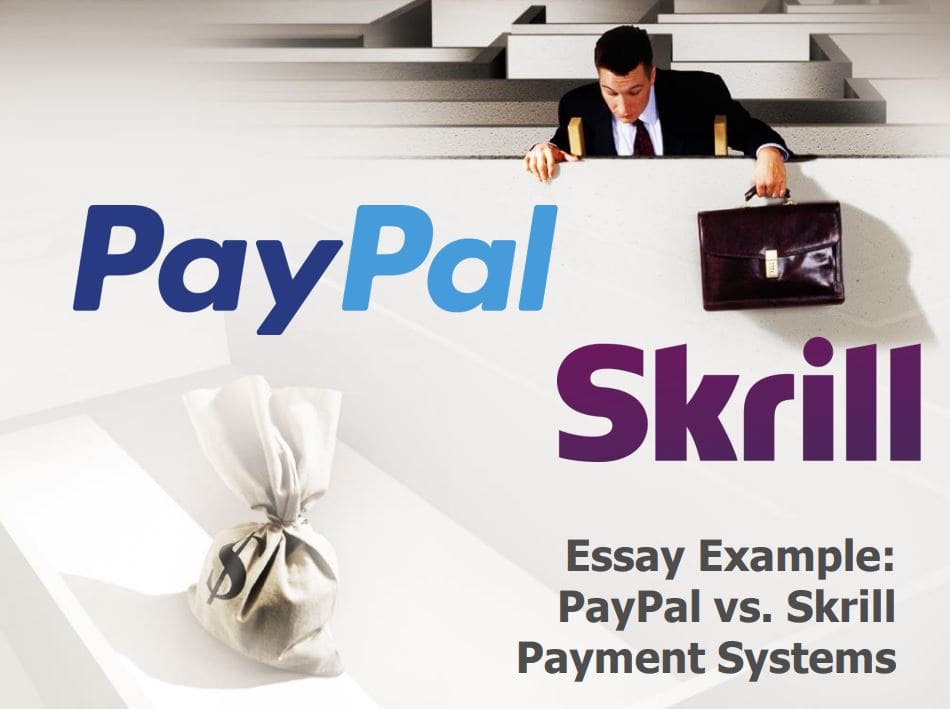People are slowly welcoming the idea of electronic payments (e-payments). Basically, PayPal and Skrill are notable players in the e-payment space. In this essay example on PayPal vs. Skrill payment systems, the first option is a more legitimate payment mode among merchants and regulation of the e-payment space compared to Skrill despite PayPal’s relatively high merchant transaction fees.
Comparing and Contrasting PayPal and Skrill
The broad adoption of PayPal among merchants results in PayPal users having a richer e-payment experience compared to Skrill users. Zorzini notes that a few merchants provide Skrill as a payment option compared to PayPal, which is accepted widely, but it is not a universal option (par. 10). A PayPal user does not need to use multiple payment platforms, which makes shopping less stressful and simplifies the process of accounting for one’s spending. Conversely, a Skrill user’s e-payment experience may be poor because of the limited number of merchants subscribed to the platform. Moreover, Skrill users have the additional burden of tracking their spending across various payment options. PayPal is a more convenient e-payment platform because most merchants have acknowledged it as an acceptable mode of payment.

Disadvantages and Advantages of Using PayPal Compared to Skrill
Although PayPal is a popular e-payment platform, PayPal users may incur additional costs due to high merchant transaction fees that are passed on to the buyers. PayPal’s merchant transaction fee comprises 4.5% of the received payment and a fixed charge, while Skrill’s merchant transaction fee includes 2.99% of the received payment and a fixed charge (Zorzini par. 10). Merchants have different surcharge policies that define the distribution of the merchant transaction fees between the merchant and the buyer. If a merchant’s surcharge policy dictates that customers take on the entire burden of merchant costs, a PayPal user may pay more than a Skrill user for an identical good or service.
Risks
PayPal and Skrill users have similar safety concerns regarding collecting and storing confidential information on e-payment platforms. Salloum et al. find that the intention of college students to employ e-payment platforms has a significant negative association with perceived security or privacy and perceived risk (79). PayPal and Skrill facilitate online transactions by facilitating the exchange of funds without sharing the banking details and personal identification information. However, PayPal and Skrill users are hesitant to transfer this responsibility to payment platforms that are susceptible to cyber-attacks and outright misuse of their confidential data.
Safety
The increasing popularity of e-payments in the marketplace has motivated governments to take appropriate measures to safeguard PayPal and Skrill users’ data against privacy breaches and third-party data misuse. For instance, Singapore’s Payment Services Act 2019 gives the Monetary Authority of Singapore the power to provide licenses for maintaining online payment systems or take them back if regulations are not followed (Republic of Singapore sec. 6). Stringent regulations surrounding the operations and data management practices should increase e-payment users’ confidence in e-payment platforms. The licensing requirement and other obligations forced on PayPal and Skrill may build trust between the platforms and its users.
Summing Up
The acceptability of PayPal transactions among a substantial portion of merchants results in an overall better user experience. The rich user experience may explain the willingness of customers to incur additional costs amid uncertainty regarding merchants’ surcharge policy. As government regulations continue to build customer confidence in e-payment platforms, PayPal is expected to become the preferred e-payment method due to its well-established brand name among merchants.
Works Cited
Republic of Singapore. Payment Services Act 2019. Singapore Statutes Online, 20 Feb. 2019, sso.agc.gov.sg/Acts-Supp/2-2019/Published/20190220?DocDate=20190220&WholeDoc=1#pr5-.
Salluom, Said, et al. “An Innovative Study of E-Payment Systems Adoption in Higher Education: Theoretical Constructs and Empirical Analysis.” International Journal of Interactive Mobile Technologies, vol. 13, no. 6, 2019, pp. 68-83. doi:10.3991/ijim.v13i06.9875.
Zorzini, Catalin. “PayPal vs Skrill (And Why You Probably Need Both).” Ecommerce Platforms, 15 Sept. 2021, ecommerce-platforms.com/articles/paypal-vs-skrill-probably-need.


